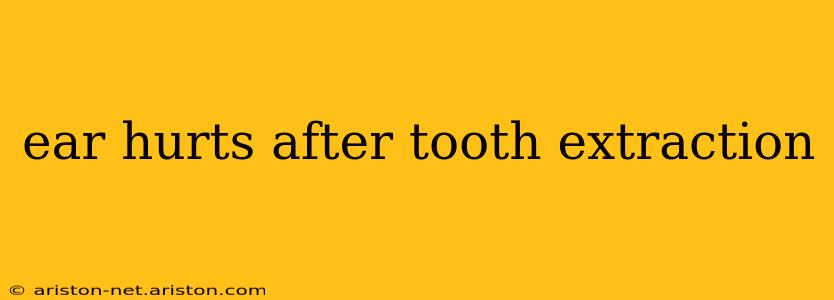Experiencing ear pain after a tooth extraction is more common than you might think. While it can be alarming, it's often a temporary side effect related to the procedure. Understanding the reasons behind this pain and knowing when to seek professional help is crucial for a speedy recovery. This comprehensive guide will explore the causes, treatment options, and preventative measures to address ear pain following a tooth extraction.
Why Does My Ear Hurt After a Tooth Extraction?
The connection between your teeth and your ears might seem unexpected, but they share close proximity within the intricate network of your head and neck. Several factors can contribute to ear pain after a tooth extraction:
-
Referred Pain: This is the most frequent cause. Nerves in your jaw and teeth are interconnected. Inflammation or irritation from the extraction site can trigger pain signals that your brain interprets as originating from your ear. This is because the nerves from the jaw and the ear run along similar pathways.
-
Infection: In some cases, ear pain can be a sign of infection at the extraction site. The infection can spread, causing inflammation and pain in nearby areas, including the ear.
-
Sinus Infection: The roots of your upper teeth are close to your sinuses. A tooth extraction in this area can sometimes lead to a sinus infection, which can manifest as ear pain. This is particularly true for extractions of upper molars.
-
Dry Socket: Also known as alveolar osteitis, this painful complication occurs when the blood clot at the extraction site dislodges or dissolves prematurely. This exposes the bone and nerve endings, resulting in intense pain that can radiate to the ear.
-
TMJ (Temporomandibular Joint) Disorder: The TMJ connects your jaw to your skull. Trauma or inflammation from the extraction can sometimes aggravate existing TMJ problems or trigger new ones, leading to ear pain.
What Should I Do If My Ear Hurts After a Tooth Extraction?
If you experience ear pain after a tooth extraction, here are some steps to take:
-
Contact Your Dentist or Oral Surgeon: This is the most crucial step. They can assess the situation, determine the cause of the pain, and provide appropriate treatment. Don't hesitate to reach out, even if the pain seems minor.
-
Over-the-Counter Pain Relief: Your dentist may recommend over-the-counter pain relievers such as ibuprofen or acetaminophen to manage discomfort. Always follow the dosage instructions carefully.
-
Ice Packs: Applying ice packs to the affected area can help reduce swelling and inflammation.
How Long Does Ear Pain After a Tooth Extraction Last?
The duration of ear pain varies depending on the cause and individual healing response. In most cases, referred pain associated with inflammation resolves within a few days. However, if the pain persists for more than a week, worsens, or is accompanied by other symptoms like fever or swelling, seek immediate dental attention.
Can I Prevent Ear Pain After a Tooth Extraction?
While you can't completely eliminate the risk of ear pain, following your dentist's post-operative instructions carefully can significantly reduce your chances:
-
Follow Post-Operative Instructions: This includes instructions on pain management, diet, oral hygiene, and activities to avoid. Strict adherence to these guidelines aids in proper healing and minimizes complications.
-
Maintain Good Oral Hygiene: This is crucial for preventing infection. Gentle rinsing with salt water can help keep the extraction site clean.
Is Ear Pain After Tooth Extraction a Sign of a Serious Problem?
In most cases, ear pain after a tooth extraction is not a sign of a serious problem. However, it's essential to be vigilant and seek professional help if:
- The pain is severe and persistent.
- You experience a high fever.
- You notice increased swelling or redness at the extraction site.
- You have difficulty opening your mouth.
- You experience any signs of infection.
This information is for general knowledge and does not constitute medical advice. Always consult with a qualified dentist or oral surgeon for any concerns about your oral health. They can provide a personalized assessment and recommend the most appropriate course of action.
